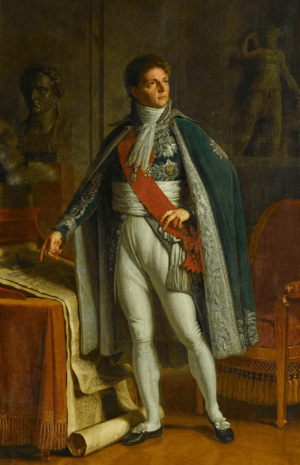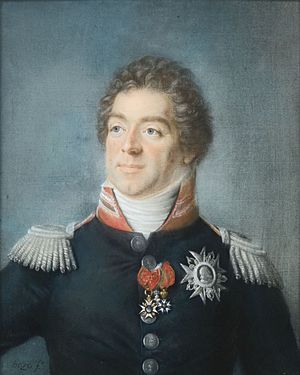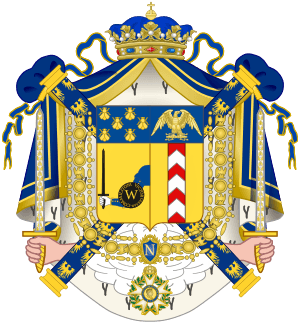Louis-Alexandre Berthier facts for kids
Quick facts for kids
Marshal of the Empire
Louis-Alexandre Berthier
Prince of Neuchâtel and Valangin, Prince of Wagram
|
|
|---|---|

Portrait by Pajou, 1808
|
|
| Minister of War | |
| In office 11 November 1799 – 2 April 1800 |
|
| Preceded by | Edmond Louis Alexis Dubois-Crancé |
| Succeeded by | Lazare Carnot |
| In office 8 October 1800 – 19 August 1807 |
|
| Preceded by | Lazare Carnot |
| Succeeded by | Henri Guillaume Clarke, Duke of Feltre |
| Sovereign Prince of Neuchâtel and Valangin | |
| In office 25 February 1806 – 3 June 1814 |
|
| Preceded by | Frederick William III of Prussia |
| Succeeded by | Frederick William III of Prussia |
| Personal details | |
| Born | 20 November 1753 Versailles, Île-de-France, Kingdom of France |
| Died | 1 June 1815 (aged 61) Bamberg, Upper Franconia, Kingdom of Bavaria |
| Relations | Jean-Baptiste Berthier (father) César Berthier (brother) Napoléon Alexandre Berthier (son) |
| Awards | Grand Cross of the Legion of Honour Commander of the Order of Saint Louis Vice-Grand Constable of France |
| Signature |  |
| Military service | |
| Allegiance | |
| Branch/service | French Royal Army French Revolutionary Army French Imperial Army French Royal Army |
| Years of service | 1764 – 1815 |
| Rank | Marshal of the Empire |
| Battles/wars | American Revolutionary War French Revolutionary Wars Napoleonic Wars |
Louis-Alexandre Berthier (born November 20, 1753 – died June 1, 1815) was a French Marshal of the Empire. He served during the French Revolutionary Wars and the Napoleonic Wars. He was also known as the Prince of Neuchâtel and Valangin, and the Prince of Wagram.
Berthier was twice the Minister of War for France. He is best known for being the chief of staff to Napoleon Bonaparte. Born into a military family, he joined the French Army at a young age. He rose quickly through the ranks during the French Revolution.
Berthier was a key supporter of the change in government that gave Napoleon power. He was present for many of Napoleon's greatest victories. However, he disagreed with Napoleon's decision to stretch supply lines too far during the Russian campaign. He was allowed to retire by the new government after Napoleon's first defeat. He died shortly before the Battle of Waterloo. Historians still see Berthier as an excellent organizer of military operations.
Contents
Early Life and Military Start
Berthier was born on November 20, 1753, in Versailles. His father, Jean-Baptiste Berthier, was a lieutenant-colonel in the army's engineering corps. Louis-Alexandre was the oldest of five children. His three younger brothers also served in the French Army, with two becoming generals.
From a young age, Berthier learned about military strategy from his father. At seventeen, he joined the army. He served in different roles, including staff, engineering, and cavalry.
Serving in America and France
In 1780, Berthier traveled to North America with General Rochambeau. There, he helped the American forces during the American Revolutionary War. When he returned to France, he became a colonel. He worked in various staff positions.
During the French Revolution, Berthier was the chief of staff for the Versailles National Guard. He helped protect the aunts of King Louis XVI from angry crowds. He also helped them escape in 1791.
Rising Through the Ranks
In 1792, Berthier became chief of staff to Marshal Nicolas Luckner. He played an important part in the Argonne campaign. He also served well in the War in the Vendée from 1793 to 1795. The next year, he was promoted to general of division. He became chief of staff for the Army of Italy, which Napoleon had just been given command of.
Berthier was very important in the Battle of Rivoli. He took over command when General Joubert was under attack. Berthier was known for his hard work, accuracy, and quick understanding. His long experience and mastery of details made him the perfect chief of staff. He remained Napoleon's most valuable assistant for the rest of his career.
Working with Napoleon
Berthier was with Napoleon throughout the 1796 campaign. After the Treaty of Campo Formio, he was left in charge of the army. In 1798, he entered Italy, took over the Vatican, and created the Roman Republic. He also took Pope Pius VI prisoner and oversaw his journey to Valence, where the Pope later died.
After this, Berthier joined Napoleon in Egypt. He served there until Napoleon returned to France. He helped Napoleon in the Coup of 18 Brumaire (November 9, 1799). This event gave Napoleon supreme power. After the coup, Berthier became Minister of War for a time.
During the Battle of Marengo, Berthier was officially the head of the Army of Reserve. However, Napoleon was with the army, and Berthier acted as his chief of staff, as always. This was a dangerous job. A staff officer named Brossier reported that at Marengo:
The General-in-Chief Berthier gave his orders with the precision of a consummate warrior... He himself was hit by a bullet in the arm. Two of his aides-de-camp... had their horses killed.
After the campaign, Berthier worked on civil and diplomatic matters. In August 1800, he went on a mission to Spain. This led to the return of Louisiana to France by the Third Treaty of San Ildefonso. This later resulted in the Louisiana Purchase.
Marshal and Prince
When Napoleon became emperor, Berthier was immediately made a Marshal of the Empire. He took part in major campaigns like Austerlitz, Jena, and Friedland. In 1806, he was made Duke of Valangin. In 1807, he became Vice-Constable of the Empire.
Napoleon also made Berthier the ruler of Neuchâtel in 1806. This lasted until 1814 and gave him the title of sovereign prince.

In 1808, Berthier served in the Peninsular War in Spain. In 1809, he served in Austria during the War of the Fifth Coalition. After this, he was given the title of Prince of Wagram.
He was with Napoleon in Russia in 1812. He was one of several who advised against advancing on Moscow, but Napoleon decided to go ahead. Berthier was said to have cried when the decision was made. He continued to serve in Germany in 1813 and France in 1814. He remained the chief of staff for the Grande Armée until Napoleon's empire fell.
Later Life and Death
After Napoleon gave up his power for the first time, Berthier retired to his large estate. He enjoyed his hobbies of falconry and sculpture. He made peace with King Louis XVIII in 1814.
When Napoleon returned to France from exile, Berthier was unsure what to do. He didn't want to fully commit to Napoleon again. This made both Napoleon and King Louis XVIII suspicious of him.
Berthier moved to Bamberg, Germany, where he died on June 1, 1815. The exact way he died is not known. Napoleon later said that if Berthier had been at the Battle of Waterloo, he might not have lost.
Berthier's Skills
Berthier was an incredibly skilled chief of staff. However, he was not a great commander on the battlefield. When he was in temporary command in 1809, the French army in Bavaria faced some difficulties.
Even though Napoleon's genius often overshadowed Berthier's abilities as a general, Berthier was famous for his excellent organizing skills. He could understand Napoleon's orders instantly and carry them out perfectly, down to the smallest detail. General Paul Thiébault said of him in 1796:
No one could have better suited General Bonaparte, who wanted a man capable of relieving him of all detailed work, to understand him instantly and to foresee what he would need.
Family Life
On March 9, 1808, Berthier married Elisabeth. She was the daughter of Duke Wilhelm in Bavaria. She was also related to the King of Bavaria and the Russian emperor.
They had one son and two daughters:
- Napoléon-Alexandre, 2nd Duke and 2nd Prince of Wagram (1810–1887)
- Caroline-Joséphine, Princess of Wagram (1812–1905)
- Marie Anne Wilhelmine Alexandrine Elisabeth, Princess of Wagram (born 1816, after her father's death – died 1878)
In Books
Berthier is mentioned or appears in several stories by Arthur Conan Doyle, including How the Brigadier Was Tempted by the Devil. He is also in Leo Tolstoy's famous novel War and Peace.
Images for kids
See also
 In Spanish: Louis Alexandre Berthier para niños
In Spanish: Louis Alexandre Berthier para niños



